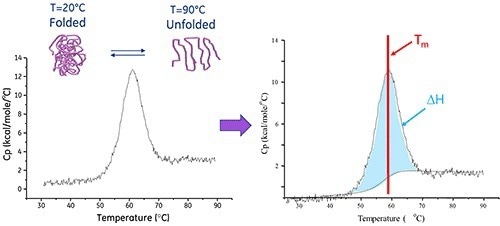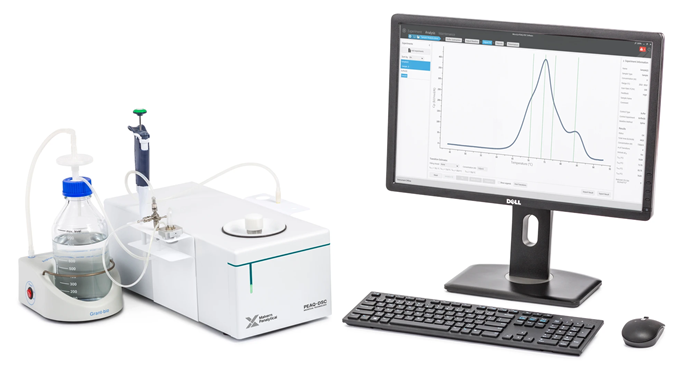The MicroCal PEAQ-DSC device delivers extremely sensitive, user-friendly microcalorimetry that helps decrease the time and expense involved with stability testing and comparability analysis. The MicroCal PEAQ-DSC is a manual instrument with a cleaning device that can be changed to an automated version upon request.
MicroCal PEAQ-DSC data assists biopharmaceutical development in protein engineering, (pre)formulation development, process development, manufacturing change control, and biosimilarity and biocomparability investigations.
The integrated software produces high-quality data and increases efficiency in biopharmaceutical research by streamlining workflows, facilitating non-subjective data analysis, performance qualification, and compliance with 21 CFR Part 11 and Annex 11 requirements.
Features and benefits
One effective analytical method for determining the thermal stability of proteins and other biomolecules is differential scanning calorimetry or DSC. This method measures the temperature (Tm) and enthalpy (ΔH) of thermally induced structural changes within molecules in solution. This data offers a critical new understanding of the forces that stabilize or destabilize nucleic acids, proteins, micellar complexes, and other macromolecules.
This information is utilized to create purification strategies, characterize and assess protein constructs, rank the affinities of ligands to their protein targets in small molecule drug discovery programs, and estimate the shelf-life of biomolecular products, including biopharmaceuticals. It also facilitates batch-to-batch and biosimilar versus innovator molecule comparisons.
The high-sensitivity MicroCal PEAQ-DSC device is easily integrated into current data handling and transmission systems. It offers automated data analysis to facilitate the development of high-integrity thermal stability data and deliver compliance with regulatory standards. Operator time is saved by leaving the instrument unattended after loading the sample. There is no need for any more consumables, reagents, or accessories with this entire system.
Key features
- The gold standard for stability-indicating methods that need minimal assay development
- Direct and label-free measurement of the native-state stability of biomolecules in solution
- Measurement of very tight binding constants, up to 1020M–1
- Manual system with pipette and cleaning device
- Strong MicroCal PEAQ-DSC program contains the following features and reduces usual data analysis time:
- PEAQ-Compliance: Malvern Access Controller (MAC) is a component of the system that allows access control to data analysis and user-defined standard operating procedures. To help comply with 21 CFR Part 11 and Annex 11 standards and to make integrating the workflow into the company's quality system easier, data can be shown using the Report Generator along with user details and the option to sign using an electronic signature. This is offered as an add-on item
- PEAQ-Performance: Identifies and verifies system readiness automatically for optimal performance
- PEAQ-Smart (including PEAQ-Finder): For data analysis and SOP-based operations. Offers novel algorithms capable of identifying even the most minute peaks and shoulders, making it easier to automatically and objectively identify many transitions—like those seen in multi-domain proteins.
- PEAQ-Compare: Perfect for batch-to-batch and biosimilarity investigations, for the quantitative analysis of DSC traces for comparability studies
- Network-ready: Email updates are given to users to notify them of the status of the test during analysis
There is also the MicroCal PEAQ-DSC Automated, which has an autosampler.
How it works
Conformational changes produced by temperature, like unfolding, are frequently observed in the functional structures created by proteins and other macromolecules. Heat is absorbed due to these modifications because the molecules' non-covalent bonds are redistributed. Differential Scanning Calorimeters efficiently measure this heat uptake.
An insulating jacket encloses the sample cell, which holds the sample of interest, and the reference cell, which holds a matched buffer solution, in the thermal core of the MicroCal PEAQ-DSC system. These two cells are heated at a constant scan rate while being measured and always kept at the same temperature.
There is a temperature differential (ΔT) between the sample and reference cells due to heat being absorbed by the unfolding of the molecules within this cell. Due to the thermal gradient created between the Peltier units, ΔT is brought back to zero by generating a proportionate voltage converted to power and forming a feedback loop.
The thermogram shows a positive displacement since protein unfolding is an endothermic process. The Tm represents the halfway point of this protein “melting” transition, and the enthalpy (ΔH) of the unfolding process is represented by the area under the curve.

Image Credit: Malvern Panalytical
Specification
Source: Malvern Panalytical
| General |
|
| Technology |
Differential Scanning Calorimetry |
| Measurement type |
Temperature midpoint (TM)
Enthalpy (ΔH)
Heat capacity change (ΔCp) |
| Cell |
|
| Cell |
Capillary |
| Cell material |
Tantalum |
| Cell volume |
130 μL |
| Sample |
|
| Sample volume |
250 µL (manual filling) |
| Typical sample concentration |
0.01 mg/mL – 10 mg/mL 1 |
| Sample throughput |
≤6 samples analyzed/8h |
| System |
|
| Noise |
0.05 μCal/°C 2 |
| Baseline repeatability |
1 μCal/°C 2 |
| Response time |
5s 2 |
| Repeatability |
<0.2 µCal/°C 3 |
| Reproducibility |
<0.08 °C St. Dev. TM and <2% RSD on ΔH 4 |
| System reproducibility |
<0.1 °C St. Dev. TM and <5% RSD on ΔH 4 |
| Multiple feedback modes |
Yes (passive, high gain and low gain) |
| Temperature range |
2 °C to 130 °C 2,5 |
| Maximum scan rate |
240 °C/h |
| Reverse scanning |
Yes |
| Pressure perturbation calorimetry (PPC) |
N/A - manual cleaning device with guided workflows |
| Cleaning solvents |
Water and detergent (Contrad 90) used as standard |
| Software |
|
| 21 CFR part 11 |
Yes, with the PEAQ-Compliance software option |
| Network ready |
Yes, with email alert capability |
| Operating environment |
|
| Operating temperature (°C) |
10 °C to 28 °C |
| Storage temperature |
-20 °C to 50 °C |
| Humidity |
10% to 70%, non-condensing (10% to 90% for storage) |
| Ingress Protection (IP) rating |
IP21 |
| Power |
100-240 V A/C, 50/60 Hz, 70 W (cell), PC as supplied |
| Certification |
CE (EN61010-1), EMC (EN61326-2-1, EN61326-1, FCC, ICES, VCCI), ISO9001:2008 |
| Weight and dimensions |
|
| Dimensions (W, D, H) |
20 cm × 44 cm × 19 cm |
| Weight |
8.2 kg |
Notes
1 Sample dependent
2 Typical results for ribonuclease (RNase) in 50 mM KAc buffer at pH 5.5, at 60 °C/h with high feedback
3 Rescans of a stable buffer
4 Using ribonuclease (RNase)
5 Range may be extended down to -10 °C upon request
Key applications
MicroCal PEAQ-DSC equipment can benefit numerous applications; a few are listed below.
Protein characterization
MicroCal PEAQ-DSC is an essential technique for protein characterization. Key questions include:
- Is the protein folded?
- Under what circumstances is the protein stable?
- Is the protein multi-domain?
- Does the protein interact with a ligand or cofactor?
Simple DSC tests can provide answers to all of these questions.
Liposomes
Liposomes are employed as possible drug delivery systems and model membrane systems. Drug absorption into liposomes and the “Structure Activity Relationships” (SAR) between membrane components can be studied by tracking changes in the phase transition temperatures and enthalpies determined by DSC. The method can be used for any substance that generates macromolecular structures like micelles.
The “Gold Standard” for structural stability analysis of biotherapeutics, biological macromolecules and polymers in solution

Image Credit: Malvern Panalytical
The MicroCal PEAQ-DSC provides tools for determining the thermal stability of proteins and other biomolecules in biopharmaceutical research, manufacturing, and beyond. It is easy to use, requires little assay development, and does not need labeling or immobilization.